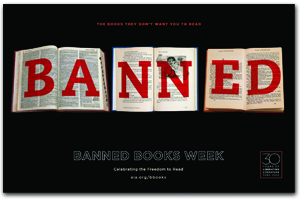Posts Tagged ‘censorship’
With Sept. 30-Oct. 6 being Banned Books Week, I want to go on the record: People — of all ages — should be able to read what they want. Yes, even those poorly written “Fifty Shades” books, if that’s what keeps them turning the pages.
It’s not so important what they read, just as long as they’re reading. Of course I’d like them to read well-written, expertly crafted tales (like mine!). But what matters is that they’re engrossed in something that allows them to escape their reality, exposes them to new ideas or just plain entertains them and keeps them out of trouble.
Besides, even the classics have their critics — a reality that not only baffles me, but riles me up and honks me off. We write because we have stories we need to share. Who is someone else to say, “Your story offends me so no one should have the chance to read it”?
Among the wealth of information on the American Library Association’s Banned Books Week website is this list of banned or challenged classics.
I’ve organized them into categories: Books I’ve read, books I want to read, books I have no interest in and ones I’ve never even heard of. (Thank goodness only a few of them ended up on that list!)
No matter where they fall on my list, try to imagine what our lives would be without them.
Read (many for a class, some for “fun,” when I had time for that kind of thing)
- The Great Gatsby, by F. Scott Fitzgerald
- The Catcher in the Rye, by J.D. Salinger
- To Kill a Mockingbird, by Harper Lee
- Beloved, by Toni Morrison
- The Lord of the Flies, by William Golding
- 1984, by George Orwell
- Of Mice and Men, by John Steinbeck
- Brave New World, by Aldous Huxley
- Their Eyes Were Watching God, by Zora Neale Hurston
- Gone with the Wind, by Margaret Mitchell (One of my all-time favorite books. I read it for the first time in 7th grade and for years wanted to live in a restored Ga. plantation house with my three cats, a tiger-striped one named Scarlett, a black one named Rhett and a white one named Ashley.)
- The Call of the Wild, by Jack London
- The Satanic Verses, by Salman Rushdie
- A Clockwork Orange, by Anthony Burgess
- A Separate Peace, by John Knowles
- An American Tragedy, by Theodore Dreiser
Want to read (if I ever have time)
- The Color Purple, by Alice Walker
- Lolita, by Vladmir Nabokov
- Animal Farm, by George Orwell
- Invisible Man, by Ralph Ellison
- Slaughterhouse-Five, by Kurt Vonnegut
- The Jungle, by Upton Sinclair
- Lady Chatterley’s Lover, by D.H. Lawrence
- The Awakening, by Kate Chopin
- In Cold Blood, by Truman Capote
- Sons and Lovers, by D.H. Lawrence
- Women in Love, by D.H. Lawrence
- Tropic of Cancer, by Henry Miller (Wasn’t there a “Seinfeld” episode featuring this one? George still had the book he checked out from his high school library …)
- Rabbit, Run, by John Updike (This book, along with other “Rabbit” books, graced my parents’ bookshelf in the living room when I was a kid, but — unlike some of Mom’s other books — I never stole it off the shelf to read it.)
Sorry, not interested
- The Grapes of Wrath, by John Steinbeck (Tried to read it in high school, but could not get through it)
- Ulysses, by James Joyce
- Catch-22, by Joseph Heller
- The Sun Also Rises, by Ernest Hemingway
- As I Lay Dying, by William Faulkner
- A Farewell to Arms, by Ernest Hemingway
- Song of Solomon, by Toni Morrison
- One Flew Over the Cuckoo’s Nest, by Ken Kesey (I watched the movie because I read Brad Pitt said he loved it, and — despite my love for Brad Pitt, hated it)
- For Whom the Bell Tolls, by Ernest Hemingway
- All the King’s Men, by Robert Penn Warren
- The Lord of the Rings, by J.R.R. Tolkien (Blasphemy, I know.)
- Sophie’s Choice, by William Styron
- Brideshead Revisited, by Evelyn Waugh
Never heard of it (showing my ignorance, I’m sure)
- Native Son, by Richard Wright
- Go Tell it on the Mountain, by James Baldwin
- Cat’s Cradle, by Kurt Vonnegut
- Naked Lunch, by William S. Burroughs
- The Naked and the Dead, by Norman Mailer






